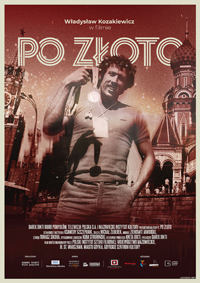From Hero to Traitor: Szczepanik Focuses on Gestures that Alter History
 Going For Gold is the fourth docu item by Polish director Ksawery Szczepanik. His previous films presented biographies of people tangled up in the reality of the Polish People’s Republic – a satellite country of the Soviet Union. His latest concerns medal-winning pole vaulter Władysław Kozakiewicz, who with one gesture became a symbol of political opposition. Swiftly told, colorful, and ingenious – Szczepanik’s documentary is not only a tribute but also a study of the beginning of the 80s and the Polish struggle for freedom.
Going For Gold is the fourth docu item by Polish director Ksawery Szczepanik. His previous films presented biographies of people tangled up in the reality of the Polish People’s Republic – a satellite country of the Soviet Union. His latest concerns medal-winning pole vaulter Władysław Kozakiewicz, who with one gesture became a symbol of political opposition. Swiftly told, colorful, and ingenious – Szczepanik’s documentary is not only a tribute but also a study of the beginning of the 80s and the Polish struggle for freedom.
It’s 1980, and at the Olympics are taking place in Moscow, the atmosphere is tense while the Soviet Union wants to show its political dominance through sport. During the games, the Moscow audience tries to discourage Kozakiewicz. Eventually, he defeats the Russian competitor and takes the world record. After winning, the Polish sportsman addresses a “bras d’honneur” to the Russian audience. And that’s where the legend starts and the Polish would coin the moment – “the Kozakiewicz gesture”.
Szczepanik presents the story of a man who entered the world of politics without having any ambitions to do so prior. He stresses how intertwined the world of sports and politics are – especially in Cold War times. His spontaneous decision changed the life of the sportsman and eventually made him leave the country for West Germany. On both sides of the Iron Curtain, his biography was used as propaganda. The time when Kozakiewicz made his gesture was especially difficult for the Polish government – in Gdańsk, the first Independent Self-governing Trade Union Solidarity was being formed. Lech Wałęsa stood at the front of the mass movement, it was the time to look for more icons. For the first time in years, Poles felt hope and Kozakiewicz also provided them with it.
Szczepanik shines a light on other elements of the story of the famous pole vaulter not only in terms of politics, but he also leaves out a space to talk about his feelings, his experiences and his big aim to win – to always go for gold. His story, popularly reduced to one gesture, finally gains details. Kozakiewicz experiences moments of failure and success that make him a character with a concrete base. The biography is supported by well conceived usage of the archive footage. Recordings of the sportsman during the competitions and details of his training are mixed with the colorful footage of the dance halls and streets of Warsaw and the lively music of the period. Also, the events connected to the Solidarity movement are shown, stressing the background of political insubordination at that time in Poland. The editing of the movie by Ziemowit Jaworski is definitely its highlight – the footage changes quickly but smoothly, making the viewer soak in the atmosphere of the 80s. Dynamic editing also stresses the personality of Kozakiewicz – his liveliness and spontaneity.
Portraying icons is a difficult task for any filmmaker. It’s easy to cross the border of pathos and pomposity but Szczepanik mostly avoids it. Kozakiewicz fits the Polish archetype of the hero against evil Russians but because of the humor and vivid editing, the documentary is not patriotically heavy. Polish documentary cinema often concentrates on showing small stories that provide a key answer about the world, as Krzysztof Kieślowski and Marcel Łoziński did in their films. The story made by Szczepanik is simpler: it’s about an individual driven by the political circumstances in a country hoping for sovereignty but being strong enough to stand up and not quit. It fits in with the other movies of the director, that tell a similar story. It seems to be modest but it’s a piece of well-crafted biography.
Reviewed on October 14th at the 2020 Warsaw International Film Festival – Documentary Competition. 61 Mins. Part of the The Fipresci Warsaw Critics Project.
★★★½/☆☆☆☆☆


